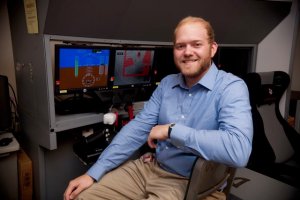Presented By: Aerospace Engineering
Aerospace Engineering Department Seminar: Engaging Undergraduate Students in the Productive Beginnings of Professional Engineering Practices

Aaron Johnson
Instructor
Department of Aerospace Engineering Sciences
University of Colorado-Boulder
In 200- and 300-level engineering science courses, students are traditionally asked to use mathematical models to solve well-defined textbook homework problems. While these problems are important for practicing mathematical problem-solving, they lack the complexity of ill-defined, sociotechnical engineering projects in the real world. In my current research I seek to bridge this gap between the engineering classroom and workplace by understanding how students engage in the productive beginnings of professional practices and how instructors can support these productive beginnings.
This seminar will focus on my research in one particular practice, engineering judgment, which is the use of mathematical models in design and analysis. I will discuss my development of a new innovative type of assignment in which students model a real-world system by making and justifying their own assumptions. The quantitative and qualitative results showcase students’ affective response to the problems, the ways in which students exhibit the productive beginnings of engineering judgment, and the influence of the assignment scaffolding on students’ work. I will conclude by outlining my future work on professional practices, including students’ development of macroethical reasoning, and formative assessment strategies instructors can use to engage students in the productive beginnings of professional practices.
About the speaker...
Aaron W. Johnson is an Instructor in Smead Aerospace Engineering Sciences at the University of Colorado Boulder. He believes in a strong connection between engineering education research and practice, and his research leverages his experience teaching engineering science courses to bridge the gap between theoretical, well-defined coursework and ill-defined, sociotechnical engineering practice. His current work seeks to develop an understanding of how students engage in the productive beginnings of professional practices and how instructors’ pedagogy and assignments can support these productive beginnings. Aaron holds a B.S. in Aerospace Engineering from the University of Michigan, and a Ph.D. in Aeronautics and Astronautics from the Massachusetts Institute of Technology. Prior to CU Boulder, he was a postdoctoral research fellow at the Tufts University Center for Engineering Education and Outreach and the University of Michigan Engineering Education Research Program. Aaron is a two-time recipient of the U-M Aerospace Department Silver Shaft Award for Undergraduate Teaching and was recently awarded the 2020 American Society for Engineering Education Apprentice Faculty Grant for promising engineering education scholars.
Instructor
Department of Aerospace Engineering Sciences
University of Colorado-Boulder
In 200- and 300-level engineering science courses, students are traditionally asked to use mathematical models to solve well-defined textbook homework problems. While these problems are important for practicing mathematical problem-solving, they lack the complexity of ill-defined, sociotechnical engineering projects in the real world. In my current research I seek to bridge this gap between the engineering classroom and workplace by understanding how students engage in the productive beginnings of professional practices and how instructors can support these productive beginnings.
This seminar will focus on my research in one particular practice, engineering judgment, which is the use of mathematical models in design and analysis. I will discuss my development of a new innovative type of assignment in which students model a real-world system by making and justifying their own assumptions. The quantitative and qualitative results showcase students’ affective response to the problems, the ways in which students exhibit the productive beginnings of engineering judgment, and the influence of the assignment scaffolding on students’ work. I will conclude by outlining my future work on professional practices, including students’ development of macroethical reasoning, and formative assessment strategies instructors can use to engage students in the productive beginnings of professional practices.
About the speaker...
Aaron W. Johnson is an Instructor in Smead Aerospace Engineering Sciences at the University of Colorado Boulder. He believes in a strong connection between engineering education research and practice, and his research leverages his experience teaching engineering science courses to bridge the gap between theoretical, well-defined coursework and ill-defined, sociotechnical engineering practice. His current work seeks to develop an understanding of how students engage in the productive beginnings of professional practices and how instructors’ pedagogy and assignments can support these productive beginnings. Aaron holds a B.S. in Aerospace Engineering from the University of Michigan, and a Ph.D. in Aeronautics and Astronautics from the Massachusetts Institute of Technology. Prior to CU Boulder, he was a postdoctoral research fellow at the Tufts University Center for Engineering Education and Outreach and the University of Michigan Engineering Education Research Program. Aaron is a two-time recipient of the U-M Aerospace Department Silver Shaft Award for Undergraduate Teaching and was recently awarded the 2020 American Society for Engineering Education Apprentice Faculty Grant for promising engineering education scholars.